'Felt like prey': Bathrooms more unsafe under new Florida law, trans people say
When Ollie was just 16 years old, they were so afraid to use the bathroom in their Collier County school that they would get panic attacks and vomit.
Ollie realized they were trans and nonbinary their sophomore year. They continued using the women's restroom, but as they began presenting as more masculine, they started to get uncomfortable looks or stares. They feared going into the men's restroom, though; the boys at school would elbow them, film them without permission, bark in their face and verbally abuse them.
After a year of this, they developed kidney stones.
"I just felt like prey," Ollie said.
USA Today Network-Florida is withholding Ollie's last name from publication for their safety.
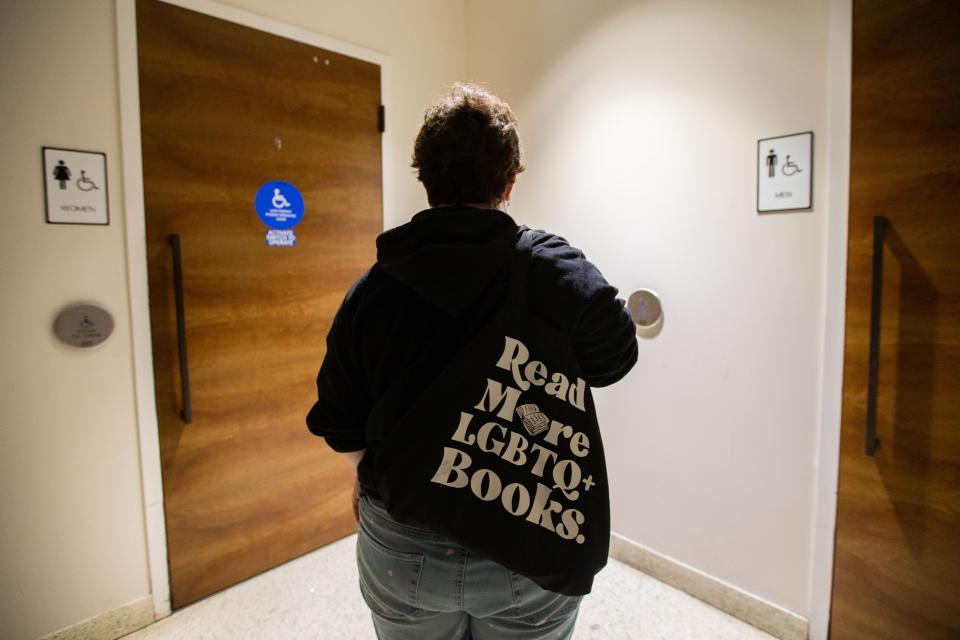
Kids across Florida are dealing with the same situation as Ollie, but now, they have even more to be afraid of: state-sanctioned punishment by school authorities. Fear of — and refusal to use — public bathrooms isn’t new, LBGTQ advocates say, but it’s gotten worse since new legislation passed this summer.
In May, Gov. Ron DeSantis, who is currently running for the Republican presidential nomination, signed a bill into law requiring transgender people to use public bathrooms that correspond with their sex at birth.
“As the world goes mad, Florida represents a refuge of sanity and a citadel of normalcy,” DeSantis said of the bill package he signed. “Florida is proud to lead the way in standing up for our children.”
Commissioner of Education Manny Diaz Jr. thanked DeSantis for signing the legislation, adding, “the Department (of Education) will remain focused on teaching students core subjects, rather than woke gender ideology or inappropriate topics.”
But LGBTQ advocates in Florida report the children they speak with are scared for their health and safety, with some avoiding public restrooms altogether.
These laws have driven some to flee Florida; others have stayed to fight back.
"Florida's become so narrow-minded and so restrictive on what exactly is a boy, what exactly is a girl," said Chris Smeckpepper Kobzina, Collier County Gay, Lesbian and Straight Education Network co-chair and longtime Floridian.
"It's so painful for those children. They're having their childhood shortened and stressed right out of existence."
Bathroom rules affecting health and learning
LGBTQ community advocates say they’re worried about the mental, physical and social impacts the bathroom rules have on transgender youth.
Joseph Knoll, a nurse practitioner and CEO of SPEKTRUM, an Orlando-based clinic specializing in care for the LGBTQ community, said he’s concerned this will push kids into unhealthy practices like not eating or dehydrating themselves.
These behaviors can lead to problems with bladder and bowel control, especially in younger children, he said. It also can increase the risk of eating disorders and tank kids’ in-class performance.
“I think it’s creating a huge distraction from where the focus really should be: on learning and participating in assignments or completing assignments,” he said.
Smeckpepper Kozbina agreed. She noted that the rules are already having an impact on kids’ mental health and ability to learn.
Kids "don't want to be outed, be told that they're in the wrong bathroom, or have the humiliation of being told to get out of the bathroom," she said. "Last year it got worse, and I'm hearing back from students that they're just afraid to go.”
New Florida laws restrict bathroom usage
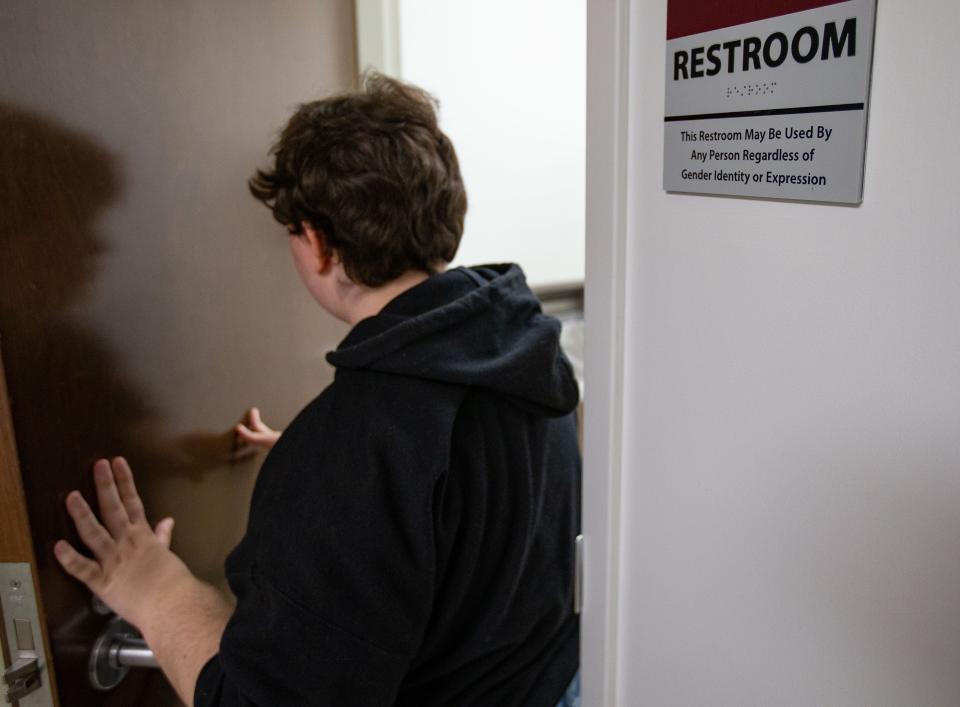
House Bill 1521 is part of the "Let Kids be Kids" bill package. In addition to requiring people to use public bathrooms that correspond with their sex assigned at birth, the law says adults who break the law can be charged with a misdemeanor.
It further requires school districts, colleges and government offices to establish rules of conduct and disciplinary measures for students or faculty who use the “wrong” bathroom.
Florida’s Board of Education also passed amendments in July, August and October to align with the law, requiring public school districts, private K-12 schools, state colleges, post-secondary institutions licensed by the Commission for Independent Education and certain post-secondary institutions not overseen by the commission to update their code of conduct to create punishments for students who don’t comply with the bathroom rules.
It's not yet clear how each school and college across the state is enforcing these new rules, particularly as it varies between facilities whether there's an option of a unisex bathroom, for example.
These rules have driven transgender kids and their families out of Florida, said 17-year-old Samira Burnside. The Tampa student attends school virtually, so she doesn’t have to worry about day-to-day access to bathrooms, but she’s seen the impact on those in her community.
“It’s created a culture of internalized fear within the queer community,” she said. “As people leave Florida, it only becomes a worse and worse place.”
When asked about the impacts of bathroom guidelines on children, Florida Department of Education communications director Cailey Myers said HB 1521 and the new rules were meant to "protect our students from bad actors so that kids can be kids."
“In Florida schools, we will not allow boys to enter girls’ restrooms," Myers said in an email statement to the USA TODAY Florida Network. "We will not tolerate any ideology that forces girls to share intimate spaces like changing rooms and bathroom facilities with boys."
DeSantis' office did not respond to a request for comment.
Right now, at Florida State University, Ollie is not yet impacted. But they worry that it’s only a matter of time before they see similar rules applied at their school.
The Florida Board of Governors, which oversees the state’s university system, announced in September its intention to vote to adopt a policy requiring students and employees to use facilities corresponding with their sex assigned at birth in accordance with HB 1521. The board is set to vote in November.
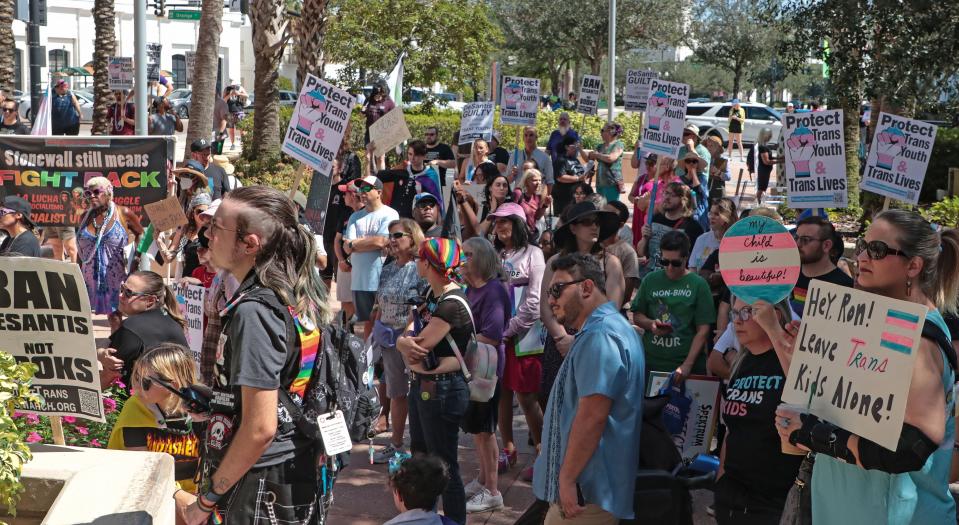
'Let Kids be Kids'
Even before the "Let Kids be Kids" bill package, school districts were already being forced to update their bathroom policies.
Leon County Schools updated its policy in early 2023 after a months-long back and forth with the Florida Department of Education. The state repeatedly found the district and its LGBTQ guide for transgender students out of compliance until Leon stated bathrooms would be segregated by biological sex at birth with reasonable accommodations, and described a reasonable accommodation as a single stall or "sex-neutral bathroom" to ensure privacy.
Leon was one of 31 districts that turned in an LGBTQ guide to the DOE.
"I'm not happy about this, but I believe we're being forced into this position," said Leon board member Rosanne Wood in January.
In Brevard, the school board reversed its LGBTQ non-discrimination policy in late 2022, saying the move was prompted by guidance from the Board of Education.
At the newly elected board's first meeting, guidelines that allowed transgender students to use the bathrooms and locker rooms that aligned with their gender identities were rescinded.
The updates, approved in 2021, had allowed transgender students to use the restroom that aligned with their gender and to be referred to by their chosen name and pronouns. Those guidelines drew backlash from Moms for Liberty and Republican State Rep. Randy Fine when they were approved, with protesters showing up outside liberal school board member Jennifer Jenkins' home with signs decrying the guidelines.
Moms for Liberty, a national conservative parental rights group that has advocated against the idea that children can be transgender, did not respond to multiple requests for comment.
Ollie said even before the bathroom bills, the stigma was “absolutely miserable.”
They spent their remaining years in high school walking to a bathroom so far away that it was “practically abandoned.”
It was the only place they felt safe enough to relieve themselves, but the effort took a toll on them.
"When you're treated as inherently controversial and a problem, you start to ... think there's something inherently wrong with (your) identity, and (that you are) deviant,” Ollie said.
‘A chilling effect’
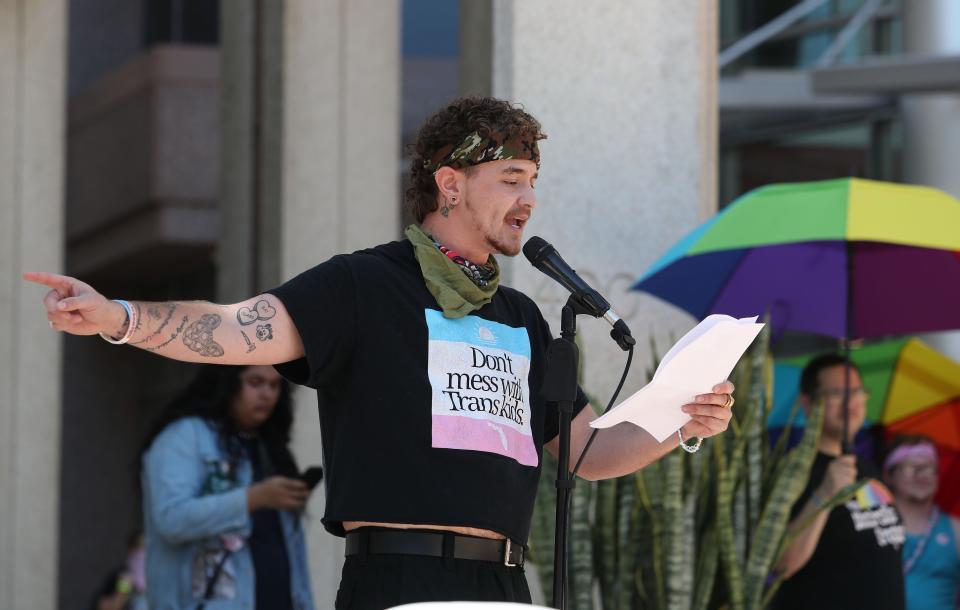
Lindsey Spero, a nonbinary Floridian, is suing the state over HB 1521, alleging the law’s impact goes beyond bathrooms. Rather than leave Florida, they've decided to stay and fight for their community.
At a march for trans rights on Oct. 7 in Orlando, the 26-year-old called the law and Board of Education rules “an attack toward trans youth.”
“Schools and libraries are some of the only places that they have in this state to be able to access literature, education, even bathrooms — a space outside of their own home, outside of their own hostile environments,” Spero said.
Limited bathroom access prevents kids from enjoying other activities, too. For Samira, enjoying things like road trips is difficult — though she’s only 17, meaning she likely would not be charged with a misdemeanor if she used the women’s restroom, there’s a “chilling effect,” which she said has spread beyond just bathroom usage.
But Samira plans to stay in Florida and fight for transgender rights. Some of her friends are leaving.
“I’m seeing a lot of them drop their in-state dream colleges to leave the state so that they can be themselves, even though they wanted to grow into members of the Florida economy that benefit this place,” she said.
Spero, who escaped to Florida with the help of their friends from conversion therapy in Pennsylvania as a teen, still sees the good in what they call “the swamp.” Their love for the Sunshine State and its queer community drove them to get involved in the lawsuit.
“We’ve still gotta (expletive) pee,” Spero told the crowd at the Orlando march. “Bathrooms are a basic human right, and the trans community is by no means the first who’ve experienced discriminatory laws targeting our bathroom use."
Jem Frantz, a trans woman, is another who has decided to remain in Florida and help the LGBTQ community. She runs a program through Visuality LGBTQ Community Center in Fort Myers helping businesses convert gendered bathrooms to all-gender bathrooms at no charge.
“Even before the bathroom bill there were trans people getting kidney stones because they didn’t want to use the bathroom, or (get) assaulted in restrooms,” Frantz said. “The bathroom bill made it imperative to move forward with this project now.”
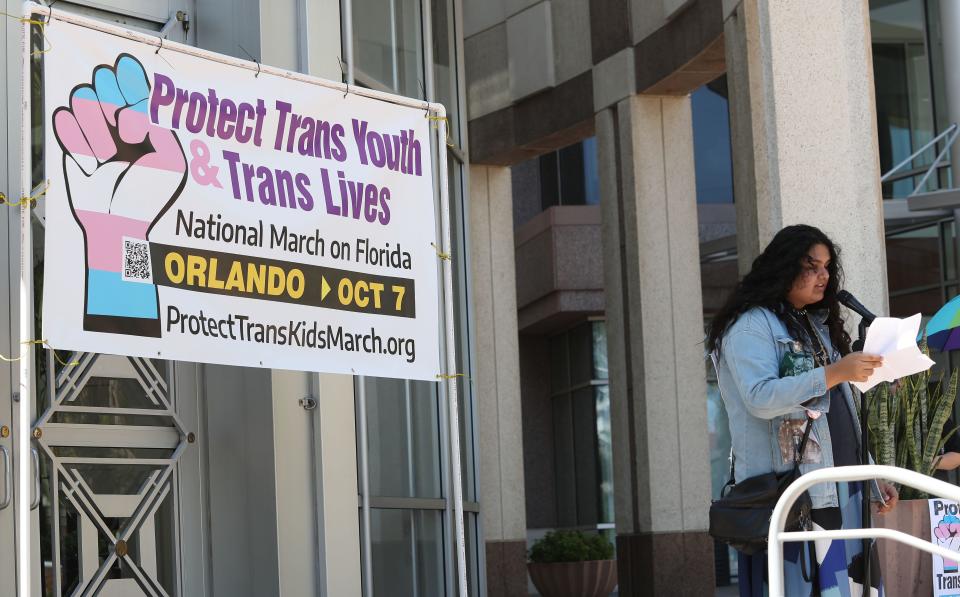
Appearing at the march, State Rep. Anna Eskimani, a Democrat, said she believes more should be done on a local level, such as in Lake Worth Beach, a Florida city that recently declared itself a sanctuary for LGBTQ people.
“We need more elected officials to step up,” she said. “Local governments can also champion policies that protect different communities, that provide additional security to gender-affirming care providers … every one of us can play a role in creating a more affirming environment.”
But for now, and for many, their future in the Sunshine State doesn’t look so bright.
Ollie, who is currently a student at Florida State University, is waiting for the Board of Governors decision. Ollie said they chose an in-state school because of their Bright Futures Scholarship; it was too good a deal to pass up. But if their very existence is criminalized, they might need to say goodbye to Florida for good.
“I really don't see myself being able to stay in the state if I'm being threatened with criminal proceedings for just existing,” they said.
Finch Walker is the education reporter at FLORIDA TODAY. Contact Walker at 321-290-4744 or fwalker@floridatoday.com. X: @_finchwalker.
Kate Cimini is the Florida Investigative Reporter for The News-Press / Naples Daily News and the USA TODAY Network-Florida. You can reach her at 239-207-9369 or kcimini@news-press.com.
Ana Goñi-Lessan is the State Watchdog Reporter for USA TODAY - Florida and can be reached at AGoniLessan@tallahassee.com. Follow her on X @goni_lessan.
This article originally appeared on Tallahassee Democrat: Florida bathroom bill causes problems beyond restrooms for trans kids
